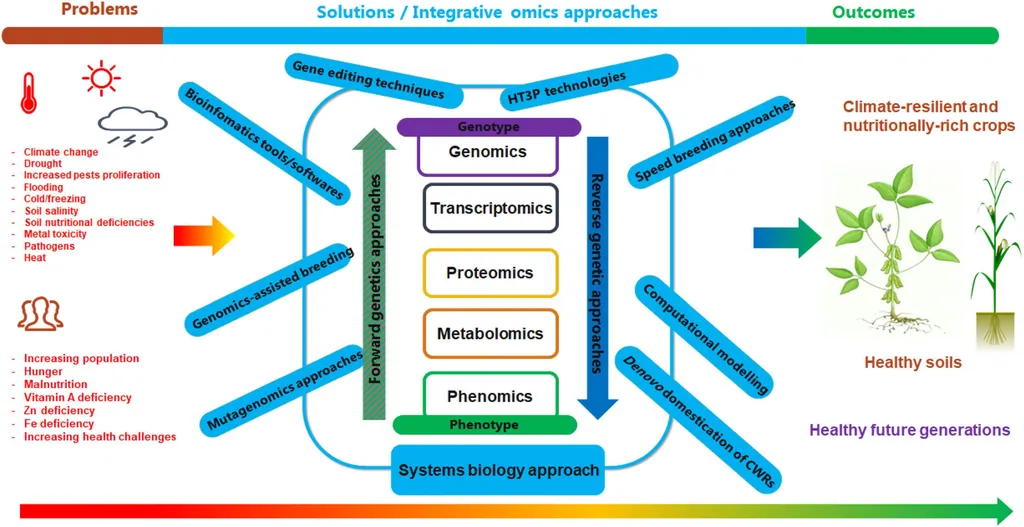In the face of escalating climate challenges, a groundbreaking review published in the journal *Plants* (which translates to “Plants” in English) offers a roadmap for developing climate-resilient crops, integrating cutting-edge technologies to revolutionize agriculture and beyond. Led by Doni Thingujam from the Department of Biological Sciences at Clemson University, the research delves into the transformative potential of multi-omics, advanced phenotyping, and artificial intelligence (AI) in creating crops that can withstand drought and extreme temperatures.
The study underscores the critical role of multi-omics—encompassing genomics, transcriptomics, proteomics, metabolomics, and epigenomics—in unraveling the genetic pathways that confer stress resilience. “By leveraging these omics technologies, we can identify key genetic traits that make crops more resilient to environmental stresses,” Thingujam explains. This holistic approach allows scientists to pinpoint the molecular mechanisms that enable plants to thrive under adverse conditions, paving the way for targeted breeding programs.
Advanced phenotyping techniques, such as drone-based imaging and hyperspectral sensors, further accelerate this process by enabling high-throughput monitoring of plant traits. These technologies provide detailed, real-time data on crop health and stress responses, significantly enhancing the efficiency of breeding programs. “Advanced phenotyping allows us to collect vast amounts of data on plant performance under various stress conditions, which is crucial for developing resilient crop varieties,” Thingujam adds.
AI and machine learning (ML) play a pivotal role in analyzing this deluge of data, predicting stress tolerance traits, and optimizing breeding strategies. By harnessing the power of AI, researchers can identify patterns and correlations that would otherwise go unnoticed, leading to more informed decision-making and faster development of climate-resilient crops. “AI-driven tools are revolutionizing the way we approach crop improvement. They enable us to process and analyze large-scale data sets, uncovering insights that can drive innovation in agriculture,” Thingujam notes.
The study also highlights the importance of plant-associated microbiomes in enhancing stress tolerance and soil health. Bioinoculants and synthetic microbial communities can boost plant resilience and productivity, offering a sustainable solution to the challenges posed by climate change. “Microbiomes are a hidden treasure trove of benefits for plants. By harnessing their potential, we can develop more resilient crops and improve soil health,” Thingujam says.
Beyond agriculture, the implications of this research are far-reaching. Climate-resilient crops can enhance food security, reduce hunger, and support vulnerable regions, while AI-driven tools and precision agriculture empower farmers, improving livelihoods and equitable technology access. “These advancements have broad societal, economic, and educational impacts. They can transform agriculture, ensuring a resilient and sustainable global food system amid climate change,” Thingujam concludes.
The integration of AI, multi-omics, and advanced phenotyping represents a paradigm shift in agricultural research, offering a glimpse into a future where technology and innovation converge to address global challenges. As the world grapples with the realities of climate change, this research provides a beacon of hope, demonstrating the power of science and technology to shape a more sustainable and resilient future.

